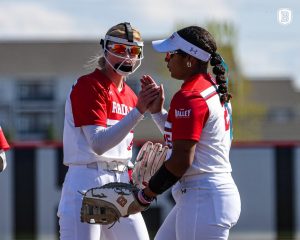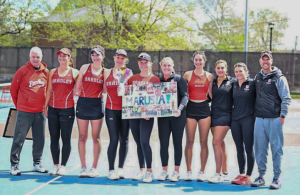Nope, play the waiting game – Alex Staab, contributor
The world of eligibility is a crazy one at the NCAA level. It’s made even crazier when athletes are granted the ability to transfer without penalty and are able to participate in their chosen sport right away.
The rules were waived this year and modified to coincide with the COVID-19 pandemic, but normally if you transfer from a Division-I school, you have to sit out one season until you are eligible.
This year has created a whole new animal, or at least brought it to the forefront: the transfer portal. By the ability to be immediately eligible, a player can just decide they don’t like the situation they’re in and pack up and leave for another college.
The present world of college athletics is not an easy one to navigate. If the immediate eligibility transfer is made a reality in the long-term as opposed to a COVID-related adjustment, that could prove to cause more harm than good.
It can be fairly easy to develop the opinion that if players can transfer with immediate eligibility that it can serve as a gateway for other moves. That can create commitment issues for the player, and the potential impression of a lack of loyalty could cause issues down the road.
Perhaps it’s with argument, but the NCAA may have bigger fish to fry at the moment. From the mishandling of the D1 Women’s Basketball Tournament to the name, image and likeness developments, it’s assuredly so that NCAA President Mark Emmert’s desk is quite full of paperwork.
Transfer away – Colin Davern, contributor
The rule requiring NCAA transfers to reside at their new school for at least a year before being eligible for their sport again needs to be overturned. The association says the rule was created with the intention of helping students succeed academically, but there’s not much merit behind it.
While many college athletes choose their school strictly based on coaches and teams, many factor academics programs into the decision as well. If an athlete discovers that a school isn’t the correct academic fit for them, why prevent them from transferring and playing right away? After all, this would delay them from entering their career field for at least a year should they decide to “go pro in something other than sports.”
Coaches have said in the past that loosening transfer rules would essentially implement free agency in college sports, when that exact thing already exists for the coaches themselves. Coaches can simply pick up and leave for another school, even when they’re still under contract. It’s quite hypocritical of them to call out athletes wanting the same power as them.
The NCAA’s power over student athletes has been dwindling in recent years with more alternate routes to the pros like the NBA G-League. They need to start giving reasonable freedoms to the players, and allowing them to switch schools without a significant penalty would be a step in the right direction.





